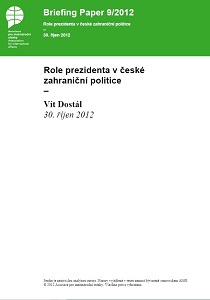Role prezidenta v české zahraniční politice
The role of the President in Czech Foreign Policy
Author(s): Vít Dostál
Subject(s): Constitutional Law, Governance
Published by: AMO – Asociace pro mezinárodní otázky
Summary/Abstract: From a constitutional, legal and political point of view, the Czech Republic is a typical representative of a parliamentary democracy in which the government is the main component of the executive power. In its performance, it is also directly responsible to the parliament. Despite this fact, the Czech political system has historically accepted the significant role of the president. In practice, all Czechoslovak and Czech democratic presidents (Masaryk, Beneš, Havel, Klaus) were actively involved in the formulation and implementation of foreign policy. Along with the prerogatives in appointing members of the banking board of the Czech National Bank and proposing or appointing various judges, according to the Constitution, foreign policy is one of the areas that the president can significantly influence. Moreover, after the introduction of direct election, the president will rely on the trust of the electorate in the exercise of this function, which will strengthen his legitimacy in the exercise of the function. // The aim of this briefing paper is to identify the main powers of the president in foreign policy, while the emphasis will be placed primarily on the representative and executive role, the role in the legislative process in approving international treaties and influence in personnel matters related to foreign policy.
Series: Association for International Affairs - Briefing Papers
- Page Count: 4
- Publication Year: 2012
- Language: Czech
- Content File-PDF

